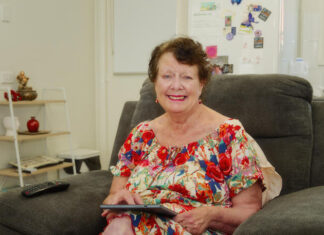Andrew Mathieson
OCEAN Grove’s Donald Gerling gives so much blood that nurses struggle to find a vein.
The inside of his left elbow in particular has taken one helluva battering from needles.
“This arm is not as good as this one,” he points to the left from the other.
“One of the girls once went straight into the scar tissue and I could feel my toes curl up but that was the only time I felt queasy.
“I think she was a bit intimidated by my presence.”
The blood donor, like most, is modest about his contribution.The numbers tell a different story.
Despite looking fit and healthy for 74, more than 2500 litres of blood has been extracted from Donald’s limbs.
Last week was Donald’s 462nd donation since he first rolled up his sleeves to give blood as a young soldier in 1953, just to get out of national service guard duties.
“That was the trouble, people back then were loath to give blood,” he recalls.
By the time whole blood was converted to plasma, in which blood cells are suspended for a longer lifespan, Donald had already made 138 donations in four states and the UK.
Plasma blood has increased the frequency with which donations can be made from every 12 weeks to fortnightly, so Donald has made more than 200 donations since the new millennium.
“I jokingly said I was going to give up when I got to 400,” Donald grins.
“Then someone at the blood bank said to me when I was on about 410 that they thought I was giving up at 400. “I told them: ‘Yeah but you forgot to tell me, so I’m going around again’.”
Little pocket-sized booklets and card documents has every injection Donald has endured.
Commemorative hallmark badges have marked past milestones and sometimes pricked the skin, too.
The bigger milestones have earned silver pewters and whisky glasses instead.
“It’s a bit big for gin and tonic,” Donald says, handing over a glass the size of a small bucket.
Around the Geelong blood bank, Donald resembles a barfly at a local pub.
Everybody knows his name and what he’ll be having.
Rather than alcohol, blood is the addiction and he takes up the same seat on the same day of the week.
“The nurses sometimes say they save the blunt needles for me,” he winks.
Health professionals say every donation saves three lives and, despite one in three Australians needing blood at some stage, only one in 30 donate.
Donald can now count 1400 saved lives in the bank, then.
His rare B-positive blood type enhances the significance of the number.
Blood recipients are usually anonymous faces to donors but two lives saved became clear to the lifetime army officer during a stint in Queensland.
A 10-year-old Townsville boy was flown to a Brisbane hospital with a hole in the heart.
It wasn’t until Donald read his story in a newspaper the next day that he breathed a sigh of relief.
“It said that if it hadn’t been for an urgent call for a blood donor there would have been trouble. They didn’t have enough B-positive,” he says.
The other case was a pregnant woman who lost a lot of blood during complications.
Donald got the phone call to rush from work because the woman needed 26 pints.
Bemused and standing at the hospital reception, Donald remembers the nurse desperately calling for Mr Gerling, then Captain Gerling, into a phone.
He tried to grab her attention.
“I’m on the phone, please,” she responded.
“I am Mr Gerling”, Donald said, pointing to the name on his tag.
“Oh, we’re ringing you to come in and donate, urgently,” the embarrassed nurse said.
“Well, I’m here,” he remembers replying with a smile.
It’s in the blood
Digital Edition
Subscribe
Get an all ACCESS PASS to the News and your Digital Edition with an online subscription
Finding security in unlikely places
When mother of four Lynda separated from her partner 10 years ago she had no idea of the challenges that lay ahead.
At the time...








